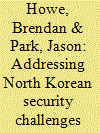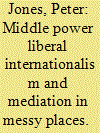|
|
|
Sort Order |
|
|
|
Items / Page
|
|
|
|
|
|
|
| Srl | Item |
| 1 |
ID:
130549


|
|
|
|
|
| Publication |
2014.
|
| Summary/Abstract |
Purpose-Discuss the potential of non-state centric economic cooperation.
Design/methodology/approach-Traditional engagement policies vis-à-vis North Korea have been state-centric, reciprocity-driven and ultimately, unsuccessful. This article proposes the promotion of sustainable, good-faith and meaningful economic exchanges by enrolling the active participation of North Korean elites through alignment with their vested interests.
Findings-Although controversial and even abhorrent from a normative perspective, the approach is eminently pragmatic and necessary to address the limited policy alternatives of an increasingly insecure regime which may eventually be forced to pursue drastic means to ensure its survival.
Practical implications-Non-state-centric international economic engagement is a non-exclusive policy prescription that seeks to broaden the range of viable policy options available to the North Korean regime.
|
|
|
|
|
|
|
|
|
|
|
|
|
|
|
|
| 2 |
ID:
176502


|
|
|
|
|
| Summary/Abstract |
Track Two processes were developed to facilitate movement in difficult international conflicts. Since Montville first coined the term, Track Two processes have considered deliberate and strategic ways to bring together adversaries in unofficial, private face-to-face interactions that allow for joint analysis and mutual learning. Such processes create the conditions for more nuanced problem definition and solution exploration. Ideally, these insights are then transferred into official peace processes, policymaking and decision-making. Transfer acknowledges a strategic dimension to planning for change; Track Two approaches abridge and accelerate the long-term accumulation approach by the strategic choice of participants, agenda and goals. This article reviews and summarizes our knowledge to date about how best to encourage Track Two inputs into negotiation and other Track One diplomatic efforts. It then offers a checklist for designing initiatives to best promote both intergroup learning and timely transfer to generate effective change.
|
|
|
|
|
|
|
|
|
|
|
|
|
|
|
|
| 3 |
ID:
164370


|
|
|
|
|
| Summary/Abstract |
Canada seeks to increase its role in mediation as part of a renewed liberal internationalist foreign policy. This means confronting the question of how to manage the domestic political consequences of engaging as a mediator with those violating cherished international norms, while also upholding the view that they should be punished. Key to all this is the concept of impartiality, particularly as it relates to the objectives of liberal internationalist countries. This paper explores multiple meanings of the term “impartial” as they pertain to mediation, particularly with respect to the question of mediations involving those who have violated international norms. The paper then explores whether increased support for “arms length” mediations, such as Track Two diplomacy, might allow for more involvement in mediation, while avoiding direct involvement in morally fraught situations. The paper concludes that Track Two can be useful in developing a national capacity for international mediation, and that work can also be done to make Track Two—which is currently based largely on Western concepts—more indigenous. However, support for Track Two does not answer the fundamental question of how Canada, as such, can be more active as a mediator if it is not willing to engage with actors who have committed atrocities.
|
|
|
|
|
|
|
|
|
|
|
|
|
|
|
|
| 4 |
ID:
097014


|
|
|
|
|
| Publication |
2010.
|
| Summary/Abstract |
The diversity of unofficial diplomacy activities in the last three decades has led to extensive attention in theoretical literature to the role of unofficial diplomacy in conflict resolution processes and to the development of a broad range of concepts used to describe different types of unofficial diplomatic activities. Yet certain unofficial activities, such as the process that preceded the Geneva Accords, do not neatly conform to the prevailing unofficial diplomacy concepts. This study seeks to contribute to the theoretical development of the unofficial diplomacy theory through an examination of the assumptions underlying models and concepts relating to unofficial diplomacy as applied to the process leading to the drafting of the Geneva Accords. The study suggests that the unofficial diplomacy process leading to the Geneva Accords was in fact "a quasi track-one" diplomacy-a diplomacy characterized by unique features, some of which weakened its potential contribution to the policy-making process.
|
|
|
|
|
|
|
|
|
|
|
|
|
|
|
|
| 5 |
ID:
139392


|
|
|
|
|
| Summary/Abstract |
Despite saying that they will never “talk to terrorists,” many countries have done so. Often these dialogues have included a component of so-called “Track Two Diplomacy.” This article examines whether such a dialogue could be held with al Qaeda and other such groups. Research demonstrates that dialogues have been useful in ending terror campaigns in certain circumstances, but that they were never the decisive element. Where they have been useful, dialogues have helped to distinguish those members of terror organizations who are willing to talk from the hardliners, in helping to develop ‘acceptable’ players on the other side, and in allowing the two sides to better understand each other. The article finds that a dialogue with the hard core of al Qaeda is likely impossible, but that some elements may be willing to talk. Such dialogues will be localized and will be about specific concerns and, like in other cases, will be about seeing if there are elements of the movement that can be detached from the hard-core base. Track Two may have a role to play in these dialogues, but expectations should be kept modest.
|
|
|
|
|
|
|
|
|
|
|
|
|
|
|
|
| 6 |
ID:
176507


|
|
|
|
|
| Summary/Abstract |
The field of peace and conflict studies has been maturing over the past few decades, not least thanks to the continual epistemological contestation between its philosophy and methodology. As a consequence, the methods of conflict resolution practice have been evolving. Dominated by realist approaches of conflict management during the Cold War, the field in the 1990s relied heavily on neo-liberal theories of economic interdependence, democracy building, and interest-based negotiations that can bring win-win outcomes. By the late 2000s, as the constructivist paradigm and critical theory started gaining ground in academia, the conceptual conversation shifted toward the possibilities of building inclusive societies and achieving structural and cultural peace via conflict transformation, rather than resolution, as the respective methodology.
|
|
|
|
|
|
|
|
|
|
|
|
|
|
|
|
|
|
|
|
|